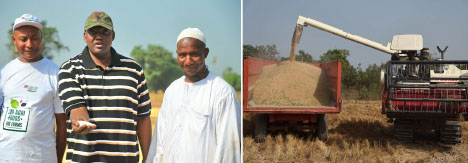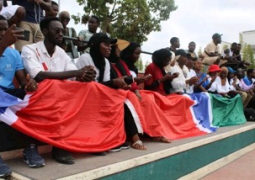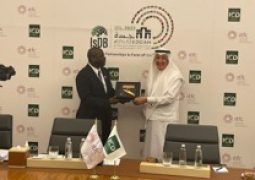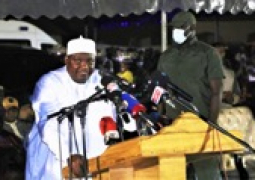
President Barrow made the remarks recently during a visit to Jah Oil Company’s rice field situated at Bayaba village in the Sami District, Central River Region (CRR north).
The visit to the rice field is part of the president’s ongoing nationwide Meet The People’s Tour. During the visit, the president and delegation also witnessed some of the harvesting processes with the final rice products packaged in bags.
Private sector investment in rice production, he said, will go a long way in not only boosting the country’s economy, but ensure that the country is rice self-sufficient.
Speaking on the massive investment made at the rice field, the President said: “With such projects, Jah Oil is contributing to food security, creating job opportunities for inhabitants of the area and also reducing the dependency on foreign exchange.”
Underscoring the significance his government attaches to rice production, he said: “My administration is more than committed to making the country food self-sufficient, especially in rice production. However, rice production involves lots of cost and resources. Therefore, we need the collaboration of all, especially the private sector.”
Barrow assured his government’s support to the Jah Oil Company in its bid to invest heavily in rice production, saying: “I want to assure you (Jah Oil Company) and others that are interested in rice production of the government’s 100% support.”
“Supporting them means we are supporting our country and our people. We have been importing rice since 1965.”
According to him, 85% of the rice we consume in the country is being imported. "Therefore, if we are serious about food security and about bringing the cost of rice down, then we have to support these kinds of projects,” he emphasised.
Such initiative, he went on, will complement the government's efforts in their drive to ensure that the target set aside in ending rice production is achieved. “I can say this is not a business, but these are projects that are of national interest. It’s the responsibility of the government to ensure that there are policies in place with a view to produce sufficient food for the Gambian people,” he admitted.
The importation of rice in the country, Barrow said, is “putting a lot of pressure in our foreign exchange. We have to take rice production as a business in order to produce rice round the year.”
“With the speed Jah Oil Company is going on in terms of rice production, I am quite optimistic that the government will meet its 2030 target of rice self-sufficiency. With the speed I have seen here, I think it can be achieved before 2030,” he said.
His government, he added, is serious about agriculture, adding: “Agriculture should be our diamond and gold. What we have is agriculture and we have to go back to the farm.”
For his part, Momodou Hydara, the managing director of Jah Oil Group, assured of their continued commitment in achieving their objectives on rice production, while commending the government for their continued support.
Highlighting some of the challenges affecting them, Hydara said: “Electricity is among the issues confronting us at the rice field as our machines consume a lot of electricity. Therefore, we want NAWEC to expand their production capacity within the area.”
“We want to have all the processing done here as we are currently building a massive ware house in the area where we will process the product here.”
He maintained that the drought affected some of their products, adding: “We were expecting to have seven tonnes per hectare, however, the basmaty was 70 to 75% successful.”
“Now we have finished the pilot project, thus our idea is to have three to four harvests annually. To be able to do this, we are trying to see what the West is trying. We have acquired six pivot systems and each pivot can irrigate around one hundred and one hectare.”
Concluding, he said: “We will be selling a bag at 1500 dalasis or 1700 dalasis. However, I can assure you all that the price will be less than 2000 dalasis.”
Read Other Articles In Headlines

Gambian students in Morocco call on MoHERST to disburse stipends on time
Sep 4, 2024, 10:21 AM



